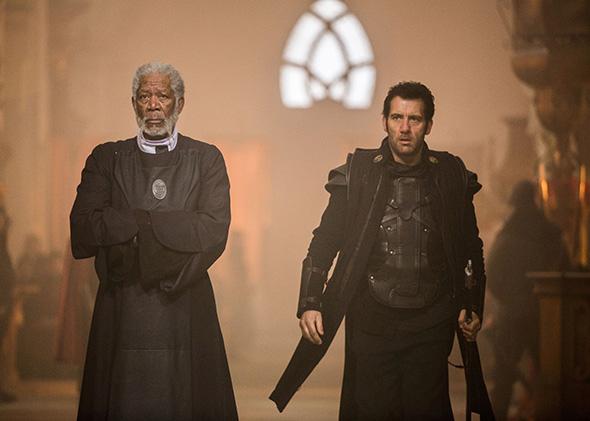On the first page of the notes I took for the occasionally flawed but really somewhat splendid historical adventure Last Knights, there’s a little aside in my plot summarizing. “Twelve-minute setup,” it says; I was a little puzzled and pretty intrigued by how long the movie was taking to establish itself. There was some developing intrigue—an emperor’s minister with a sadistic demeanor (the divinely named Gezza Mott, played by Aksel Hennie) had demanded and been given an underling’s daughter as a bride, and the aging nobleman Bartok (Morgan Freeman) was showing signs of wear. But the chief developing plotline involved extensive tribute demanded by the emperor for the fortification of his castle. (What is it with the auteurs of epics and plotlines about taxation?) Even Kurosawa doesn’t leave you waiting quite this long for the suspense to crest. I kept expecting somebody to draw his sword, or overcorrect an out-of-line peon with an ax.
It took almost 40 minutes for Last Knights to give me that first pound of flesh, and I figured then that a riot would break out for sure. Mott forces Bartok’s knight and surrogate son Raiden (Clive Owen, grim and steady) to perform a brutal deed, and though the camera dwells for the better part of a minute on Raiden’s face, contorted with agony, eyes filled with tears, director Kazuaki Kiriya cuts away at the actual moment of impact. Just as the blade’s whipping through the air, we cut to moments later, a tight shot of Raiden’s now-bloody hand, outside in the rain by this point, because bloody hands look cool in slow-motion rain.
So that’s coming up on an hour, right? In that hour, we’ve seen lush settings and meticulously designed sets—castles, courtyards, trees in rain—playing host to some overwritten but generally engaging dialogue about a despotic emperor’s assistant and his thirst for power. (It’s hard to get mock-medieval right, and Michael Konyves and Dove Sussman’s screenplay doesn’t.) Things will get hairy now, eh? That’s how these movies work, isn’t it? Not yet. Be patient.
It’s this demand for patience that—slowly—won me over, and makes the languid, unhurried Last Knights worth recommending. It feels, honestly, the way a roleplaying game sometimes does: characters going grindingly through errands of their daily lives because most of daily life involves exactly that kind of grind. Raiden’s plotting revenge, of course; he must; but we don’t get even a hint of it until the one-hour mark. We spend time in Raiden’s city, now in chaos, its clan dissolved by Gezza Mott, its markets become dens of sin and squalor. We see Raiden sell off his property—his sword!—and grow distant from his wife. He broods. He drinks. And finally, just when we’re nearly certain that somehow investors financed a movie about the cruel effects of state power on a once-proud knight, one without any knightly deeds at all—that’s when we join conspirators at a table in a room beneath the city, planning an attack.
There aren’t really any surprises; the pleasure’s all in the telling, but it’s a considerable pleasure. The performances are all top-shelf, very fine actors making do with the script they’ve got—Morgan Freeman’s crucial speech to the emperor is, naturally, a joy, and Owen perfectly inhabits a man playing his cards close to his chest. By the time any actual battle begins, there’s only half an hour left; the battle in question is an epic siege on the castle, and delivers its flashy goods quickly and brutally.
Add on the tragic denouement that’s the plot’s only logical ending, and what you’re left with is an extended consideration of a few general principles—loyalty, justice, fealty to one’s station—playing out against some of the most beautiful settings you’ll see anywhere. Last Knights feels anachronistic to me, which I mean as a compliment. Once upon a time, filmmakers had the luxury of giving their genre movies time to breathe; you don’t see much of that on a big scale any more. I loved this movie, warts and all. It’s a big small thing. There isn’t much to it, but there’s still much to like.
